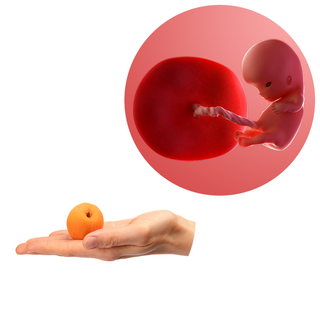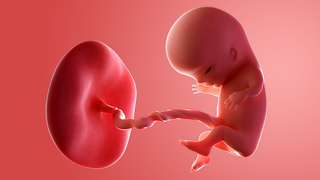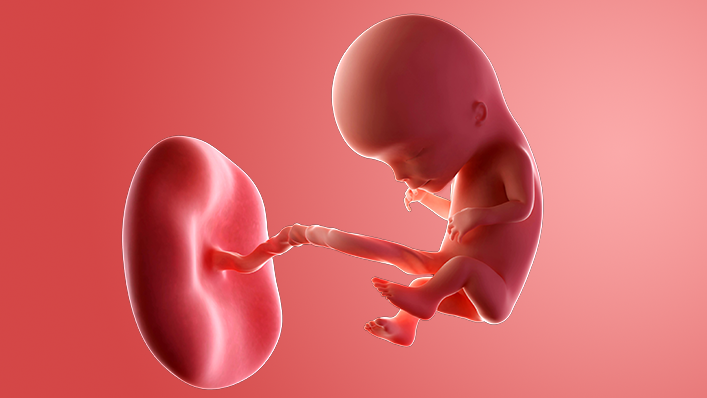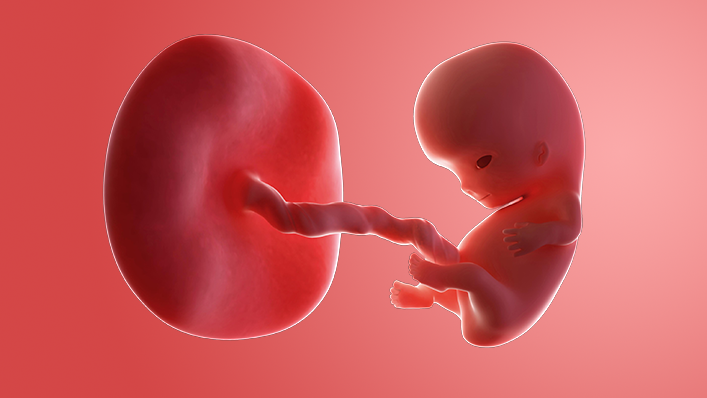Week 10
Welcome to week 10. Pregnancy is divided into 3 chunks, called "trimesters". You are nearly at the end of your 1st trimester.
By the 2nd trimester you will probably have lots more energy and all those signs of early pregnancy will gradually fade away.
Around now, you may have a booking appointment with a midwife. You'll be asked lots of questions about your health and medical history. You can ask lots of questions too.
What's happening in my body?
You may be struggling to do up your jeans. Your uterus (womb) is around the size of a large orange, while your baby is more like the size of an apricot.
You may be feeling bloated and you might find yourself burping or passing wind – this is due to your hormones. The female hormone progesterone is just doing its job – relaxing the muscles in your womb so that it can expand along with your growing baby.
However, in the process, the muscles in your digestive tract also become looser and this can lead to symptoms such as heartburn.
Early pregnancy symptoms (at 10 weeks)
Your signs of pregnancy may include:
- extreme tiredness
- nausea
- mood swings
- a metallic taste in your mouth
- sore breasts
- indigestion and heartburn
- headaches
- dizziness
- new likes and dislikes for food and drink
- a heightened sense of smell
- a white milky pregnancy discharge from your vagina
- light spotting (see your doctor if you get bleeding in pregnancy)
- cramping, a bit like period pains
- darkened skin on your face or brown patches - this is known as chloasma or the –mask of pregnancy–
- greasier, spotty skin
- thicker and shinier hair
- bloating and the feeling of being bloated
Read Tommy's guide to common pregnancy symptoms.
If any symptoms are worrying you, talk to your midwife or doctor.
How to beat the bloating
You can help digestive problems such as bloating and burping by changing what you eat. Try making yourself 6 small meals a day and avoid eating late at night.
Eat slowly, sip fluids and avoid smoking and alcohol. A short stroll after meals may help. Some people find their symptoms happen after drinking coffee or eating rich, spicy and fatty foods.
Read NHS advice on dealing with indigestion and heartburn in pregnancy.
What does my baby look like?
Your baby, or foetus, is now around 30mm long from head to bottom, which is about the size of a small apricot.
The baby will be making jerky movements and baby's movement can be seen on a scan.
Your baby is going through another huge growth spurt. The head is still too big for the body, but the face is more recognisably in proportion. The eyes are half closed but can react to light.
The ears are starting to form, the mouth now has a delicate upper lip and the nose has 2 little nostrils. The jaw bone is shaping up too, and contains tiny versions of your baby's milk teeth.
The heart is beating extremely quickly at 180bpm – that's about 3 times your heart rate.

Action stations
Sexually transmitted infections (STIs)
Do you think you or your partner could have an STI? If so, get checked out, as this could affect your baby's development. Talk to your midwife or GP, or visit a sexual health clinic.
Long-term conditions
If you have a long-term health condition, then let your specialist or GP know you're pregnant as soon as possible.
Don't stop taking any regular medication without discussing it with your doctor first.
Want to know when the baby's due?
Use the NHS's pregnancy due date calculator. You'll get a more accurate date from your doctor or midwife when you have a dating scan (usually at 8 to 14 weeks).
More in week-by-week

Week 11
You only have 2 weeks until you start your 2nd trimester. This is when many women start to "glow" and regain their energy as their hormones settle down.
More in week-by-week guide to pregnancy


